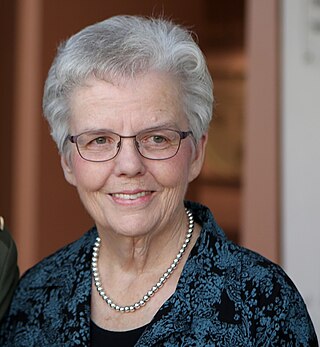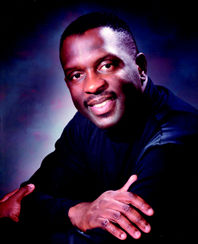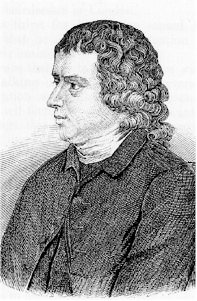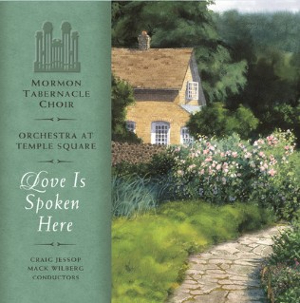
TheTabernacle Choir at Temple Square, formerly known as the Mormon Tabernacle Choir, is an American choir, acting as part of the Church of Jesus Christ of Latter-day Saints. It has performed in the Salt Lake Tabernacle for over 100 years. The Tabernacle houses an organ, consisting of 11,623 pipes, which usually accompanies the choir.

Sir John Milford Rutter is an English composer, conductor, editor, arranger, and record producer, mainly of choral music.

"Simple Gifts" is a Shaker song written and composed in 1848, generally attributed to Elder Joseph Brackett from Alfred Shaker Village. It became widely known when Aaron Copland used its melody for the score of Martha Graham's ballet, Appalachian Spring, premiered in 1944.

Mack J. Wilberg is an American composer, arranger, conductor, and choral clinician who has been the music director of the Tabernacle Choir at Temple Square (Choir) since 2008.

Janice Kapp Perry is an American composer, songwriter, and author. As a member of the Church of Jesus Christ of Latter-day Saints, she has written over 3,000 songs, some of which appeared in the church's official hymnal, and in the Children's Songbook. Some of her most well-known songs include "I Love to See the Temple" and "A Child's Prayer."

Moses George Hogan was an American composer and arranger of choral music. He was best known for his settings of spirituals. Hogan was a pianist, conductor, and arranger of international renown. His works are celebrated and performed by high school, college, church, community, and professional choirs today. Over his lifetime, he published 88 arrangements for voice, eight of which were solo pieces.
"Cindy" is a popular American folk song. According to John Lomax, the song originated in North Carolina. In the early and middle 20th century, "Cindy" was included in the songbooks used in many elementary school music programs as an example of folk music. One of the earliest versions of "Cindy" is found in Anne Virginia Culbertson's collection of Negro folktales where one of her characters, Tim, "sang a plantation song named 'Cindy Ann'," the first verse and refrain of which are:

"Come Thou Fount of Every Blessing" is a Christian hymn written by the pastor and hymnodist Robert Robinson, who penned the words in the year 1758 at the age of 22.
"The Wayfaring Stranger", Roud 3339, is a well-known American folk and gospel song likely originating in the early 19th century about a plaintive soul on the journey through life. As with most folk songs, many variations of the lyrics exist and many versions of this song have been published over time by popular singers, often being linked to times of hardship and notable experiences in the singers' lives, such as the case with Burl Ives' autobiography.

Jesus Christ the Apple Tree is a poem, possibly intended for use as a carol, written in the 18th century. It has been set to music by a number of composers, including Jeremiah Ingalls (1764–1838), Elizabeth Poston (1905–1987) and John Rutter.
A Gaelic Blessing is an English language choral composition by John Rutter, consisting of four vocal parts (SATB) and organ or orchestra. It is also known by the repeating first line of the text, "Deep peace". The work was commissioned by the Chancel Choir of First United Methodist Church, Omaha, Nebraska, for their conductor Mel Olson. It was published first in 1978 by Hinshaw Music, by Oxford University Press and by the Royal School of Church Music.
The choirs at Brigham Young University (BYU) consist of four auditioned groups: BYU Singers, BYU Concert Choir, BYU Men's Chorus, and BYU Women's Chorus. Each choir is highly accomplished and performs from an extensive repertoire. Together, the choirs have recorded and released over 30 albums. The choirs perform frequently throughout the academic year, both as individual ensembles as well as a combined group.
The Wexford Carol or the Enniscorthy Carol is a traditional religious Irish Christmas carol originating from Enniscorthy in County Wexford. The subject of the song is the nativity of Jesus Christ.

Consider the Lilies is a religious album released by the Mormon Tabernacle Choir. The album was originally released in 2003. It was remastered in 2023 along with a release on vinyl. The music in this first album on the choir's new label represents a broad range of musical feeling—from the joyful "Rejoice, the Lord is King!" and "Morning Has Broken" to the contemplative "O Holy Jesus" and "Pilgrims' Hymn" to the fervent affirmations in "I Believe in Christ" and "This Is the Christ."

Love is Spoken Here is a 2005 album by the Mormon Tabernacle Choir. The album contains "Songs of Heart and Home" and includes hymns, lullabies, and other assorted songs with orchestral accompaniment directed by Mack Wilberg.
The O.C. Tanner Gift of Music is a series of free concerts presented in Salt Lake City by the Utah Symphony and the Tabernacle Choir at Temple Square, with soloists, conductors and other choirs as guests. The concerts have been hosted by the Church of Jesus Christ of Latter-day Saints on Temple Square since 1983. The thirtieth anniversary gala concerts were held September 6 and 7, 2013.

"Down in the River to Pray" is a traditional American song variously described as a Christian folk hymn, an African-American spiritual, an Appalachian song, and a Southern gospel song. The exact origin of the song is unknown. The most famous version, featured in O Brother Where Art Thou?, uses a pentatonic scale, common in many African American spirituals.
O clap your hands is an anthem in English for choir and organ by John Rutter. He composed the setting of verses from Psalm 47 in 1973 for a four-part choir and organ, and also made a version with orchestra. It was first published in 1973. Later, Rutter included it in Psalmfest, a collection of nine psalm settings.

Mack Wilberg's Requiem is a large-scale work for chorus, orchestra, a soprano and a baritone soloist. Wilberg began composition in 2006 and it was premiered in 2007 in Salt Lake City, Utah. It comprises seven movements, which together last thirty-four minutes. It was published in 2008 by Oxford University Press.












